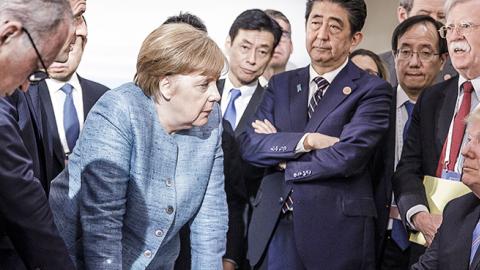The governments of Japan and Germany seem to understand how important their respective alliances with United States are. Yet it is startling how sharply the two capitals diverge in their views of the presidency of Donald Trump.
At the Munich Security Conference earlier this month, I heard Trump denounced for his “unilateralism.” I heard him called out for his decision to leave the Iran deal, for his tough line on China (especially on Chinese tech firms and their 5G systems), and for his blunt criticism of Germany’s plan to build the Nord Stream II natural gas pipeline to Russia. I heard him criticized for announcing Washington's intention to withdraw from the treaty with Russia banning intermediate-range nuclear weapons in Europe.
Traveling on to Tokyo, I heard Trump described as the most pro-Japan president in decades—a man who understands Japan’s security challenges, especially with regard to China and North Korea, and a partner who has worked hand-in-hand with the Japanese and Indian governments to build out Prime Minister Shinzo Abe’s “Free and Open Indo-Pacific” strategy.
Why is this so? Germany and Japan face fundamentally different strategic landscapes today. When the Munich Security Conference launched in 1963 as the Wehrkunde (“military science”) conference, it was an exclusively U.S.-German gathering that drew defense officials and intellectuals to discuss matters of hard power. At the time, Germany was a front-line state against the Soviet Union.
Under the American security umbrella, the priorities of post-Cold War Western Europe have shifted. Mostly gone is the talk of military affairs, replaced by the concept of peace through dialogue. Multilateralism is the name of the game: in addition to American officials, the foreign ministers of Russia, Iran, Qatar and key leaders from China offer keynote remarks at Munich. Even the term “security” is more nebulous. In Germany’s contemporary strategic culture, it means a focus on development, multilateral engagement, and the quest for peace. There is far less discussion of such issues as the manpower or equipment needed to deter strategic adversaries.
Implicit in this new German understanding of security is the importance of engagement, especially with adversaries. Thus, the door is open to Moscow through Nordstream, to Beijing through commerce, and to Tehran through the Obama administration’s Iran deal, where a key interest is to find a way for German businesses to work around newly reimposed U.S. sanctions.
German security culture was once that of a front-line Cold War state preparing for a Soviet invasion through the Fulda Gap. Now, Germany has outsourced matters of “hard” security to the United States, leaving Berlin to pursue commercial interests under a cheerful multilateralism.
Japan, by contrast, has undergone almost a reverse transformation under Prime Minister Shinzo Abe. In the decades following World War II, Japanese diplomacy largely expressed itself through multilateral institutions, especially the United Nations. But Abe and his advisors have taken Japanese strategic culture in the opposite direction of Germany’s. Sensing the challenge posed by the rise of China, especially in the East and South China Seas, and that of North Korea, Mr. Abe has been raising strategic and military questions of the sort that once dominated the old Wehrkunde in Munich. He has dramatically increased Japan’s defense spending and shifted diplomacy away from its footing in multilateral institutions to a focus on its key strategic partners in Asia and its alliance with the United States. In this respect, the Japan of today is the Europe of yesteryear.
Nowhere are the divergent perspectives between Germany and Japan more apparent than over Iran and North Korea. Germany was the strongest possible supporter of the Iran deal, even though it offered no permanent restrictions on Iranian nuclear weapons programs. When Mr. Trump tore it up, Germany reacted vehemently.
Yet from Abe’s perspective, an Iran-style agreement between the United States and North Korea would have been a strategic disaster, granting Pyongyang assistance, relief from sanctions, and access to international markets without anything close to full and verifiable denuclearization. For Abe, the grounds for Mr. Trump’s rejection of the Iran deal are a prerequisite for the kind of negotiation with North Korea that would safeguard Japan’s security needs.
When Vice President Mike Pence gave a major speech in October last year frankly portraying China as a threat to U.S. and allied interests, many in Japan welcomed it as a bracing shift to a realistic view of the geopolitics of Asia. By contrast, the lukewarm reaction to the vice president’s speech in Munich on the challenges posed by Russia, China and Iran shows that fewer Germans are thinking in geopolitical terms.
It becomes all the more important, then, for Americans to stay engaged with those who do. In the end, the divergence between Germany and Japan has less to do with the personality of Trump than the different perceptions of the security challenges facing each country. Abe knows he lives in an increasingly dangerous neighborhood—a view Trump shares.



















